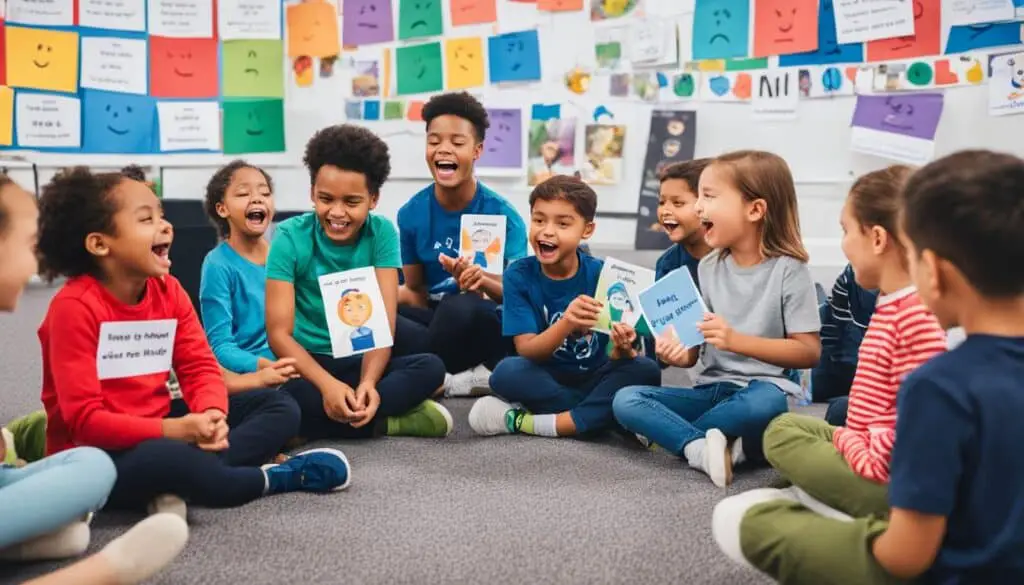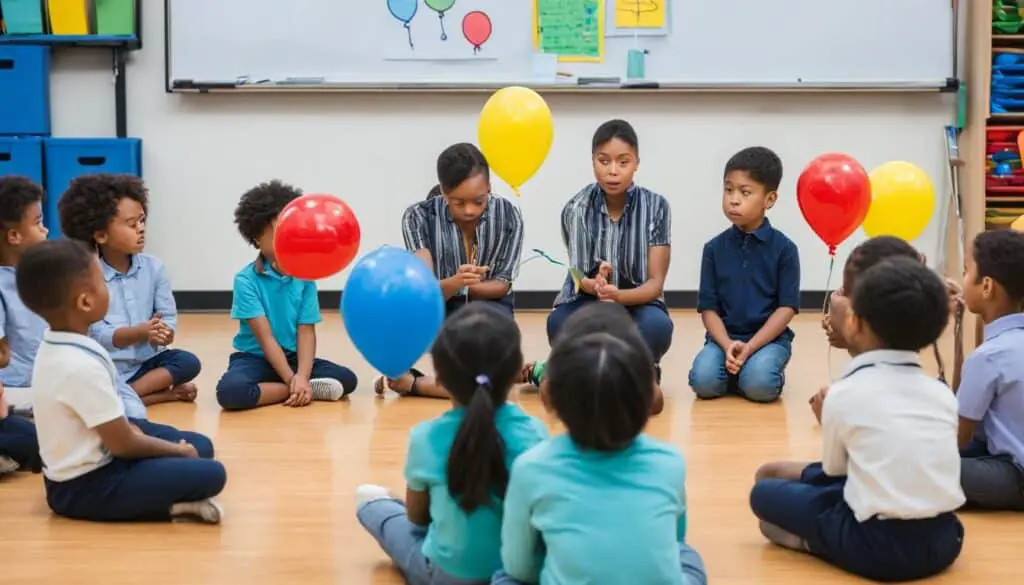
Teaching Emotional Intelligence to Kids: Techniques and Benefits
As a parent, caregiver or educator, you want to equip your child with the necessary skills that will help them thrive in their daily lives and prepare them for the future. One of the essential skills that children need is emotional intelligence. Emotional intelligence gives them the ability to recognize and regulate their emotions, which is crucial for their overall well-being.
In this article, I will be discussing emotional intelligence training for kids. We will delve into what emotional intelligence is, the benefits of emotional intelligence training, techniques for teaching emotional intelligence, and practical ways to integrate emotional intelligence training into your child’s daily life.
Key Takeaways:
- Teaching emotional intelligence to kids is crucial for their emotional and overall well-being.
- Emotional intelligence involves the ability to recognize, understand, and manage emotions effectively.
- Emotional intelligence training can help develop empathy, resilience, and positive social skills.
- Techniques for teaching emotional intelligence include promoting self-expression, active listening, teaching problem-solving, and providing opportunities for emotional understanding and management.
- Integrating emotional intelligence training into daily life can help kids achieve long-term success.
What is Emotional Intelligence?
Emotional intelligence is a crucial skill that involves identifying, understanding, and managing emotions effectively. It is the ability to recognize one’s emotions and the emotions of others, then respond appropriately. This skill takes into account self-awareness, empathy, self-regulation, and social skills.
Self-awareness is the foundation of emotional intelligence. It involves recognizing one’s feelings and the impact of those emotions on oneself and others. Empathy is the ability to understand and relate to the feelings of others. It enables people to respond appropriately to others’ needs and build stronger relationships.
Self-regulation refers to the ability to manage one’s emotions and behaviors appropriately. It involves controlling impulsive behaviors and responses to overwhelming emotions. Social skills include effective communication, cooperation, and conflict resolution.
“Emotional intelligence is not just a buzzword, but a vital skill that can enhance our daily interactions and overall well-being.”
The Benefits of Emotional Intelligence Training for Kids
Emotional intelligence training for kids is essential for their overall development. By teaching children to recognize and regulate their emotions, they can build essential life skills that will help them deal with life’s ups and downs. Here are some of the benefits of emotional intelligence training for kids:
- Develops empathy: Emotional intelligence training helps children understand and appreciate the emotions and feelings of others.
- Improves resilience: Children who have strong emotional intelligence are more resilient and can better weather the storms of life.
- Enhances problem-solving abilities: By developing their emotional intelligence, kids can better handle conflicts and problem-solving situations.
- Promotes positive social skills: Emotional intelligence training helps children communicate more effectively with their peers and build stronger relationships.
- Boosts overall well-being: By learning to manage their emotions, children can experience higher levels of happiness and life satisfaction.
Overall, emotional intelligence training is an essential tool to empower children to navigate life’s challenges, improve their social skills, and enhance their overall happiness and well-being.

Techniques for Teaching Emotional Intelligence to Kids
As parents, educators, and caregivers, we can all play an essential role in teaching emotional intelligence to kids. By incorporating the following techniques into our daily interactions, we can help children develop the skills needed to recognize, understand, and manage their emotions effectively.
Promoting Self-expression
Encouraging children to express their feelings freely is a crucial first step in emotional intelligence training. By providing a safe and supportive environment, kids can learn to articulate their emotions, thoughts, and experiences more effectively. This can involve activities like art, journaling, or storytelling, where children can express themselves authentically and without fear of judgment.
Active Listening
Listening actively and attentively is another key component of emotional intelligence training. By practicing active listening, we can teach children to value and respect others’ perspectives, fostering empathy and compassion. Encourage kids to repeat what they heard to ensure they understand and validate the speaker’s feelings. It’s important to clarify that active listening is not just waiting for the other person to finish talking, but also responding thoughtfully to what they said.
Encouraging Empathy
Empathy—putting oneself in another’s shoes—is critical to developing emotional intelligence. Encouraging kids to imagine how others might feel in various situations can help them understand and relate to others better. For example, ask children what they think their friend feels when they’re upset, jokingly ask them what they think their stuffed animal might feel when they forgot to take it to bed.
Teaching Problem-Solving
Teaching problem-solving skills is a practical way to enhance children’s emotional intelligence. Encourage kids to come up with possible solutions to a problem and evaluate the consequences of each solution. It teaches children how to apply logic, challenge assumptions, and consider the possible outcomes of their actions, which helps them regulate their emotions and make better decisions.
| Technique | Description |
|---|---|
| Promoting Self-expression | Encourage kids to express their feelings freely through art, journaling, or storytelling. |
| Active Listening | Teach kids to listen actively and attentively to others’ perspectives, fostering empathy and compassion. |
| Encouraging Empathy | Encourage kids to put themselves in others’ shoes and imagine what they might feel in various situations. |
| Teaching Problem-Solving | Help kids develop problem-solving skills by encouraging them to come up with solutions and consider the consequences of their actions. |
Providing Opportunities for Emotional Understanding and Management
Finally, providing opportunities for emotional understanding and management can allow children to develop the skills to recognize and regulate their emotions. This can involve simply asking children how they feel and helping them understand those emotions, as well as brainstorming together to identify ways to manage those emotions effectively. It’s essential to provide space for children to practice their emotional understanding and management in a supportive environment.
By employing these techniques regularly, we can help children learn and practice critical emotional intelligence skills that will serve them throughout their lives.

Integrating Emotional Intelligence Training into Daily Life
Practical integration of emotional intelligence training into daily life can ensure long-term success for children. They will use emotional intelligence in everyday life without even realizing it. It is important to grab moments in daily activities where a child can learn to recognize and regulate their own emotions. These can be either spontaneous or structured activities.
Storytelling
Stories are an excellent way to help children understand their emotions and develop empathy for others. Incorporate stories that feature emotional experiences in them, allowing the child to reflect on their own feelings and those of others. You can also ask them to create their own stories, encouraging self-expression and emotional understanding.
Role-playing
Role-playing provides a safe space for children to practice regulating their emotions and expressing themselves in various social situations. Choose scenarios that might be challenging for your child, such as sharing toys or resolving conflict, and provide guidance to navigate these situations. This will teach them problem-solving and communication skills.
Structured Conversations
Regular open conversations will offer children an opportunity to share experiences and emotions in a positive, non-judgmental environment. These conversations will improve their communication skills and help educate them about the importance of expressing and regulating their own emotions. Additionally, it allows them to understand the need to develop empathy and social skills which helps in maintaining relationships.
Conclusion
In teaching emotional intelligence to kids, we are investing in their future. By providing them with the skills to recognize, understand, and manage their emotions, we are empowering them to navigate life’s challenges, build strong relationships, and lead fulfilling lives.
Integrating emotional intelligence training into children’s daily lives is essential for long-term success. Parents, educators, and caregivers can use techniques like self-expression, active listening, empathy encouragement, problem-solving teaching, and emotional understanding and management opportunities to make training effective.
We should prioritize emotional intelligence training for kids to ensure their emotional well-being and future success. As we continue to emphasize this essential life skill in our children, we help create a brighter future for them and society at large.
FAQ
What is emotional intelligence?
Emotional intelligence refers to the ability to identify, understand, and manage emotions effectively. It involves self-awareness, empathy, self-regulation, and social skills.
Why is emotional intelligence training important for kids?
Emotional intelligence training is important for kids because it helps them develop skills to recognize and regulate their emotions. This can lead to improved relationships, better problem-solving abilities, and enhanced overall well-being.
How can emotional intelligence training benefit kids?
Emotional intelligence training can benefit kids by helping them develop empathy, resilience, and positive social skills. These skills can contribute to their success in various aspects of their lives.
What techniques can be used to teach emotional intelligence to kids?
Techniques for teaching emotional intelligence to kids include promoting self-expression, active listening, encouraging empathy, teaching problem-solving, and providing opportunities for emotional understanding and management.
How can emotional intelligence training be integrated into daily life?
Emotional intelligence training can be integrated into daily life by incorporating it into everyday activities such as storytelling, role-playing, and structured conversations.